|
|
|
Sort Order |
|
|
|
Items / Page
|
|
|
|
|
|
|
| Srl | Item |
| 1 |
ID:
118719


|
|
|
| 2 |
ID:
118580
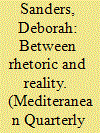

|
|
|
|
|
| Publication |
2012.
|
| Summary/Abstract |
As a powerful littoral state with important security interests in the Black Sea, Russia has the ability to use the maritime domain to advance and protect its interests, which will affect regional and international security. Using the currently available literature, this essay examines the three factors that shape and affect Russia's maritime power in the Black Sea: quantitative factors such as the number and capability of maritime platforms as well as access to maritime infrastructure; qualitative factors such as the morale of maritime personnel; and the strategic context in which Russia exercises its maritime power. It argues that Russian maritime power is likely to decline significantly. Not only will Russia have significantly fewer maritime platforms in the future, but its ability to use the maritime domain will be compromised by qualitative problems and poor relations with the United States and littoral states such as Georgia and Romania.
|
|
|
|
|
|
|
|
|
|
|
|
|
|
|
|
| 3 |
ID:
153551


|
|
|
|
|
| Summary/Abstract |
The United States and India have forged a remarkably close security relationship since 2000, given the previous hostility of India to American foreign policy in general. Indian state identity until the mid-1990s was shaped by nonalignment and antipathy to the US-led liberal economic order. If identity is the source of interests, then how do states adopt policies that conflict with core elements of their identity when geopolitical shifts push states to adapt to a new regional balance of power? We argue that India did this by activating parts of the state identity that were compatible with American state identity and de-emphasizing those elements that were incompatible. But in doing so, Indian state identity changed, which impacts future foreign policy choices. This case illustrates the reciprocal relationship between security interests and state identity. We use content analysis of ten years of Indian media to demonstrate that the depiction of the US–Indian relationship increasingly focused on the democratic shared values of both states, despite beginning with an emphasis on military cooperation.
|
|
|
|
|
|
|
|
|
|
|
|
|
|
|
|
| 4 |
ID:
080898
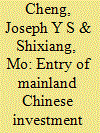

|
|
|
|
|
| Publication |
2008.
|
| Summary/Abstract |
This article examines the issues related to the admission of mainland Chinese capital and enterprises into Taiwan triggered off by Taiwan's membership in the World Trade Organization, including the coordination of political views, the adjustments in policies, the revisions of statutes, and the setting up of administrative monitoring mechanisms in Taiwan. The issue of entry represents the interaction of economic and security interests on both sides of the Taiwan Strait, and it reflects the Chinese leadership's united front offensive, the competition among the political parties in Taiwan, and the business community's articulation of its interests in the island. The analysis aims to illustrate legislative and other processes involved in the economic exchanges across the Taiwan Strait. These processes allow various parties concerned to set up obstacles that obstruct the desired economic exchanges. At the same time, the mutual economic interests, or at least the substantial economic interests on one side of the Taiwan Strait, constantly provide the momentum to overcome the obstacles. More importantly, the sophisticated business community can always find ways to overcome the obstacles in pursuit of their interests, for example, use of subsidiaries in tax havens.
|
|
|
|
|
|
|
|
|
|
|
|
|
|
|
|
| 5 |
ID:
100392
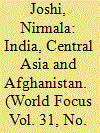

|
|
|
| 6 |
ID:
128434
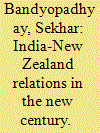

|
|
|
|
|
| Publication |
2013.
|
| Summary/Abstract |
India-New Zealand relations, which could be historically dated back to the days of the British Empire, lacked until recently in substance and were rocked by several irritants, the most important of which were the divergent views on the issue of nuclear non-proliferation. However, in last one decade or so there have been some remarkable developments in this bilateral relation, as the security interests of the two nations have converged, volume of trade increased, educational ties grew stronger and people-to-people contacts improved significantly. While there still remain some challenges, as negotiations for a Free Trade Agreement have taken longer time than expected, there are also immense possibilities. This essay looks critically at those challenges and possibilities in the relationship between two countries, which on the one hand share some historic common grounds, but are also set apart by geography as well as numerous systemic dissimilarities.
|
|
|
|
|
|
|
|
|
|
|
|
|
|
|
|
| 7 |
ID:
115947
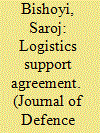

|
|
|
|
|
| Publication |
2013.
|
| Summary/Abstract |
Logistics support between the armed forces of India and the US will be a vital aspect for enhancing cooperation in capability development to respond to natural disasters and address emerging security threats of the twenty-first century. As the 2005 India-US New Framework Defence Agreement highlights the broader areas of convergence of security interests, the exchange of logistics support facilities would further enhance bilateral defence cooperation as well as India's strategic role, keeping in view the projected expansion of the Indian Navy's role beyond the Indian Ocean Region (IOR). The absence of appropriate logistics support mechanism between the two countries would hamper such capabilities to effectively deal with the security challenges during emergency situations. This article argues that the logistics support agreement the US has signed with many other countries and a similar agreement that it had proposed for India, is a mutually beneficial agreement. However, both sides need to make efforts to arrive at a consensus that is consistent with their national interests and policies.
|
|
|
|
|
|
|
|
|
|
|
|
|
|
|
|
| 8 |
ID:
087317
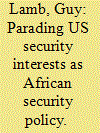

|
|
|
|
|
| Publication |
2009.
|
| Summary/Abstract |
The creastion of US Africa Command is not one of these benevolent rarities. In cruide terms, AFRICOM has been principally created with the aim of enhancing the security of the United States government and its citizens, botha at home and abroad.
|
|
|
|
|
|
|
|
|
|
|
|
|
|
|
|
|
|
|
|
|